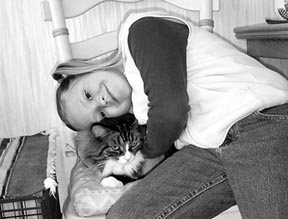Deciding to authorize euthanasia is one of the most important and toughest decisions youll ever make. Perhaps your ill or aged cat will slip away peacefully in his sleep. But more often, it will be up to you to make that final decision for him. How will you know when its time? To whom can you turn for informed and sympathetic guidance?
Trust your veterinarian – shes encountered numerous situations that called for this emotionally difficult decision. Many veterinarians have also experienced this dilemma from the other side of the examining table – as loving, and sometimes conflicted, caregivers for their own companion animals.
When You Cant Do Everything
Catherine Hegarty, DVM, of the Colonial Veterinary Hospital in Ithaca, NY, lost her 18-year-old cat Briquet to renal failure three years after initial diagnosis. I had him since I was in the fifth grade, she recalls. I actually think it was easier for me to decide when it was time than for most clients because, unfortunately, Ive seen a fair share of cats whove suffered. I knew exactly what I didnt want Briquet to go through for my sake.

288
Before that, we lost other cats when I was quite young. My mother was a single parent, and there were financial constraints in some instances. I tell clients about these experiences when they may not be financially able to pursue diagnostics and treatment, so they dont feel guilty, says Dr. Hegarty. In another case, we lost a cat to feline leukemia. That made me understand how helpless clients feel when they want and can afford to do everything – but nothing can be done.
Quality of Life Issues
Jane Brunt, DVM, of the Cat Hospital at Towson in Baltimore, MD, also uses her own experiences to guide clients. I encourage them to reminisce, so theyll remember the happy times after they go through the stages of grief. Sometimes Ill share my experiences with my first cat from veterinary school who saw me through many life changes and was my consistent, constant companion.
A colleague once offered Brunt some advice she uses as a touchstone, He taught me the three most important things in treating cancer, and I use the same guidelines in addressing all end stage problems:
1. Quality of life
2. Quality of life
3. Quality of life.”
What to Look For
What are the signs that might signal your cats quality of life has deteriorated to the point that euthanasia may be the most humane step?
Uncontrollable pain is an obvious answer, notes Brunt, although cats are often very clandestine about pain. The veterinarian can hopefully provide insight into the level of pain for guiding clients to the kindest decisions. Some cats are very accepting of oral or injectible medications that will make them feel better and improve their quality of life. Other cats, however, would be absolutely miserable and hide all the time, dreading the time for treatment or medications. In that case, attempting to provide those medications actually decreases that cats quality of life.
Both Hegarty and Brunt also look for the disruption or cessation of the cats normal, everyday activities in helping their clients to determine whether their cats quality of life has declined.
Hegarty stresses the importance of providing an accurate diagnosis to give the client as much input as possible in coming to a decision. Both emphasize that the caregiver must make the final decision. While I often advise clients to consider euthanasia, Im very careful to let the decision be theirs, says Hegarty.
No matter what, I support the clients decision. There are certainly cases where I might have done something differently if the cat were mine, but I always tell the client, You know your cat best, and you know how he might react to more invasive diagnostics or more aggressive therapy. I also suggest they critically ask themselves, Is my cat enjoying life most of the time or not?
The Kindest Decision
Brunt also tells her clients that as hard as the decision is, Theyre not giving up, and theyre doing the kindest thing for their friends and companions by not allowing them to suffer and endure continued discomfort and pain. Sometimes people just have to be reassured that when they make the decision, its not wrong and they should harbor no feelings of guilt. Its a huge weight for some people to carry; and when the outcome is inevitable, the caregivers should be at peace, knowing theyve done the right thing.



